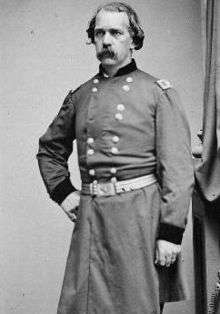J. H. Hobart Ward
| John Henry Hobart Ward | |
|---|---|
 John Henry Hobart Ward | |
| Born |
June 17, 1823 New York City, New York |
| Died |
July 24, 1903 (aged 80) Monroe, New York |
| Place of burial | Community Cemetery, Monroe, New York |
| Allegiance |
United States of America Union |
| Service/branch |
United States Army Union Army |
| Years of service |
1842–1847 (USA) 1851–1859 (NY Militia) 1861–1864 (USA) |
| Rank |
|
| Battles/wars | |
John Henry Hobart Ward (June 17, 1823 – July 24, 1903), most commonly referred to as J.H. Hobart Ward, was a career United States Army soldier who fought in the Mexican–American War and served in the New York state militia. He also served as a Union general during the American Civil War.
During the Civil War he was wounded several times, and noted for both his performance in the 1863 Battle of Gettysburg and for his misconduct in the 1864 Battle of the Wilderness. After the war Ward worked in New York's Superior Court, and was also remembered for his death when he was hit by a train.
Early life
Ward was born in New York City to a family of military veterans. His grandfather John Ward had fought in the American Revolutionary War and had suffered a disabling wound, as had his father, James Ward, during the War of 1812. Hobart Ward was educated at Trinity College and enlisted at the age of 18 in the 7th U.S. Infantry. He was promoted several times over the next four years, reaching the rank of Sergeant Major.
Mexican-American War
Ward saw considerable combat action during the Mexican-American War, fighting in the siege of Fort Brown and being wounded at the Battle of Monterrey. He recovered in time to participate in the capture of Veracruz.
Ward returned to his native New York and served as assistant commissary general from 1851 until 1855, when he became the state's commissary general, a post he held until 1859.
Civil War service
Responding to President Abraham Lincoln's call to arms at the outbreak of the Civil War, Ward recruited the 38th New York Infantry and was appointed its first colonel. He led his regiment at the July 1861 First Battle of Bull Run, becoming acting commander of Brig. Gen. Orlando B. Willcox's brigade when the latter was wounded in battle. He next saw action in the 1862 Peninsula Campaign in Brig. Gen. David B. Birney's brigade of III Corps. Ward continued to perform well during the Northern Virginia Campaign, seeing more action at Second Bull Run and Chantilly. For his efforts, he was promoted to brigadier general of volunteers on October 4, 1862, and assigned command of what had been Birney's brigade in the III Corps of the Army of the Potomac. (Birney had succeeded Maj. Gen. Philip Kearny, who had been killed leading his division at Chantilly.) Ward commanded the brigade at Fredericksburg and Chancellorsville.
Gettysburg
During the Gettysburg Campaign, Ward's brigade was assigned on July 2 by Maj. Gen. Daniel Sickles to hold a large area from the Wheatfield Road to Devil's Den. Stretched thin with little reserves, Ward's brigade nevertheless held their ground stubbornly. Regiments were moved to threatened points of the line, especially the left flank. Finally it was driven back by determined Confederate attacks. Ward became temporary commander of the division when Birney assumed corps command following the wounding of General Sickles. Col. Hiram Berdan took command of Ward's brigade. Ward lost 781 officers and men out of 2,188 present, a loss of 35.7%.[1] Ward suffered a wound on July 2 but did not relinquish command.[2]
Late 1863 and 1864
Ward was again wounded later that summer in fights at Kelly's Ford and Wapping Heights. During the Overland Campaign in the spring of 1864, he was assigned a brigade of Birney's 3rd Division, II Corps, one of the divisions in III Corps before the army reorganization of March 1864. Ward was wounded in the head at the Battle of Spotsylvania Court House. Removed from command on May 12 by Maj. Gen. Winfield S. Hancock for "misbehavior and intoxication in the presence of the enemy during the battle of the Wilderness," Ward was arrested on June 12. Despite these charges, he was nevertheless honorably mustered out on July 18, 1864.[3]
Postbellum career
After the war, he was a civil employee of New York City, serving as a clerk in the Superior Court from 1871 to 1896.
Death
At the age of eighty, Ward died in Monroe, New York, after being struck by a passing Erie Railroad train. Following a funeral in Brooklyn, his body was brought back to Monroe and buried in the city's Community Cemetery.
See also
Notes
References
- Eicher, John H., and David J. Eicher. Civil War High Commands. Stanford, CA: Stanford University Press, 2001. ISBN 0-8047-3641-3.
- Gottfried, Bradley M. Brigades of Gettysburg. New York: Da Capo Press, 2002. ISBN 0-306-81175-8.
- Warner, Ezra J. Generals in Blue: Lives of the Union Commanders. Baton Rouge: Louisiana State University Press, 1964. ISBN 0-8071-0822-7.
- "Gen. Ward, Veteran of Two Wars, Killed by a Train." Text from New York Times obituary posted on July 25, 1903.
Attribution
 This article incorporates text from a publication now in the public domain: Wilson, James Grant; Fiske, John, eds. (1891). "article name needed". Appletons' Cyclopædia of American Biography. New York: D. Appleton.
This article incorporates text from a publication now in the public domain: Wilson, James Grant; Fiske, John, eds. (1891). "article name needed". Appletons' Cyclopædia of American Biography. New York: D. Appleton.
External links
- "J. H. Hobart Ward". Find a Grave. Retrieved August 12, 2010.